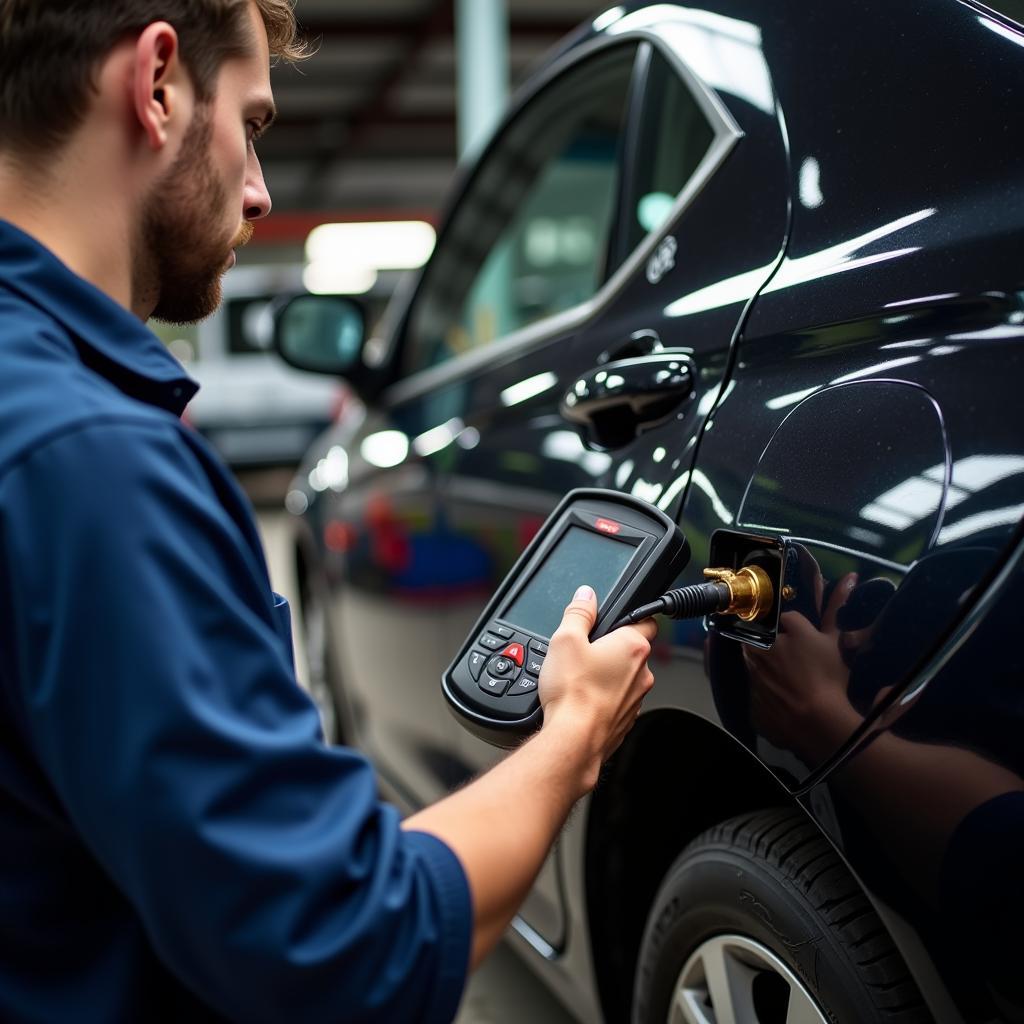You notice your car acting up, that dreaded “check engine” light glaring at you from the dashboard. Your heart sinks – it’s probably time for a trip to the mechanic, which often means a hefty bill. One of the first things they’ll likely do is run a car diagnostic test. But why are these tests, often touted as a quick scan, so expensive? You might be surprised to learn that the price tag reflects much more than just plugging in a cable.
Let’s delve into the factors that contribute to the cost of car diagnostic tests and demystify the process.
The Complexity Under the Hood: It’s Not Just a Simple Scan
While it might seem like a quick plug-and-play situation, modern vehicles are essentially rolling computer networks. Your car’s computer system, also known as the Engine Control Unit (ECU), monitors a complex web of sensors throughout the vehicle. These sensors collect data on everything from engine temperature and fuel pressure to emissions and airbag deployment systems.
When you experience a problem, the ECU stores a trouble code, like a digital breadcrumb trail leading to the source of the issue. A diagnostic test reads these codes, and that’s where the “not-so-simple” part comes in.
Specialized Equipment & Software: A Significant Investment for Mechanics
 Mechanic Using Diagnostic Scanner
Mechanic Using Diagnostic Scanner
The days of simple code readers are long gone. Mechanics now invest heavily in sophisticated diagnostic scanners and software to keep up with the ever-evolving technology in vehicles. These tools are far from one-size-fits-all. Different car manufacturers, models, and even model years may require specific software or adaptors to access the ECU and interpret the data accurately.
This specialized equipment needs regular updates to stay current with the latest software releases from manufacturers. Think of it like your smartphone – you need the latest software updates to access new features and ensure everything runs smoothly. These updates come at a cost for mechanics, which factors into the overall expense of diagnostic tests.
Beyond the Codes: The Expertise to Decipher the Data
Imagine getting a medical scan – the results wouldn’t mean much without a doctor to interpret them. The same applies to car diagnostics. Retrieving the codes is just the first step. Experienced mechanics possess the knowledge and skills to:
- Accurately identify the faulty system or component. Sometimes, a single problem can trigger multiple error codes, or a code might indicate several potential issues.
- Differentiate between symptoms and root causes. This requires a deep understanding of how different car systems interact and the ability to pinpoint the underlying problem.
- Determine the necessary repairs. Once the problem is identified, mechanics draw upon their expertise to recommend the most effective and cost-efficient repair solutions.
This level of diagnostic skill and knowledge comes from years of training, experience, and continuous professional development.
The Value of Accurate Diagnostics: Avoiding Costly Misdiagnoses
While it might be tempting to opt for the cheapest diagnostic test available, keep in mind that an inaccurate diagnosis can lead to:
- Unnecessary repairs: Replacing parts that aren’t actually faulty can quickly drain your wallet.
- Prolonged downtime: If the wrong issue is addressed, your car might be out of commission for longer than necessary.
- Safety risks: A misdiagnosed problem, especially one related to critical safety systems, can jeopardize your safety and that of your passengers.
Investing in a comprehensive diagnostic test from a reputable mechanic can save you money, time, and potential headaches in the long run.
Factors Influencing Diagnostic Test Costs
Several factors can influence the cost of car diagnostic tests:
- Vehicle make and model: Luxury or high-performance vehicles often require more specialized equipment and software, leading to higher costs.
- Complexity of the problem: Diagnosing intermittent issues or problems involving multiple systems can be more time-consuming and expensive.
- Labor rates: Mechanic’s labor rates vary depending on location, experience, and shop overhead.
- Additional diagnostic procedures: Sometimes, further investigation, such as visual inspections or road tests, may be necessary to pinpoint the problem accurately.
Conclusion
While car diagnostic tests might seem expensive at first glance, it’s crucial to remember that you’re paying for much more than just a code reading. You’re investing in advanced technology, specialized expertise, and the peace of mind that comes with an accurate diagnosis. By understanding the factors that influence these costs, you can approach car repairs with greater confidence and make informed decisions about your vehicle’s maintenance.
FAQs
- How often should I get a car diagnostic test? It’s generally a good idea to have a diagnostic test performed annually as part of your routine vehicle maintenance or whenever you experience unusual car behavior.
- Can I perform a car diagnostic test myself? While DIY code readers are available, they often provide limited information and can’t replace the expertise of a qualified mechanic.
- What should I do if the check engine light comes on? It’s best to schedule a diagnostic test with a trusted mechanic as soon as possible to identify and address the underlying issue.
If you’re experiencing car troubles or have questions about diagnostic testing, don’t hesitate to reach out to our team of experts at DiagFixPro. We’re here to provide you with the information and support you need to keep your vehicle running smoothly. Contact us via WhatsApp: +1(641)206-8880, Email: [email protected]. Our customer support team is available 24/7 to assist you.

Leave a Reply